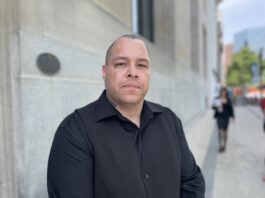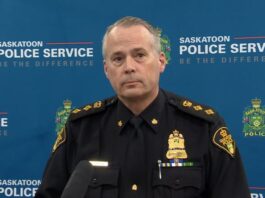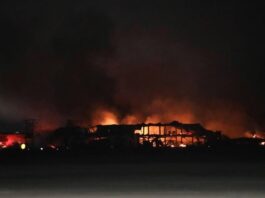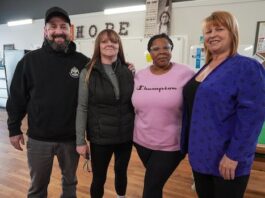
Day 611:36Despite 2020 calls to ‘defund the police,’ police budgets across Canada have increased every year since
Following the murder of George Floyd in the summer of 2020, anti-racism, violence and police protests gained traction across the world, including Canada, as did calls to “defund the police.”
An Ipsos survey that year showed more than 50 per cent of Canadians supported the idea.
But not everyone saw eye-to-eye on what that phrase meant. Some said it meant budget cuts and reinvestment in other community social programs, while others believed police forces should be completely disassembled.
Regardless, a Concordia University associate professor says the research he’s conducted indicates that no major Canadian city police department has had its funding reduced since 2020.
“They’ve all increased their police budgets, but we can see some differences in the rate of increase before 2020 and after 2020,” said Ted Rutland, associate professor of geography, planning and environment.
“Edmonton and Calgary were increasing their budgets at a much larger rate before 2020, and since 2020 they’ve been relatively small increases. So we could see that as a kind of positive change.”
Montreal has gone in the opposite direction, according to Rutland, increasing at a relatively small rate before 2020, and then at record levels in the wake of the Black Lives Matter movement.
In a statement to CBC News, the Montreal police force said its budget will reach $787.1 million in 2023, up $63.2 million from 2022 — and that 88 per cent of the new money is related to payroll, including 123 new hires.
The increase will help bolster the police presence in metropolitan Montreal and “combat armed violence,” the statement said.
Likewise, in January a proposal to increase Toronto’s police budget by almost $50 million was unanimously passed by the force’s board.
The new funding marks the start of a multi-year plan to “create capacity, make much needed investments in technology, and to adjust to the challenges faced in policing a rapidly growing city,” according to a statement provided by the Toronto Police Service on behalf of Chief Myron Demkiw.
“What we can say for sure,” about police budgets, said Rutland, “is that around 82 per cent of new money will go toward personnel.” Mostly police officers but also civilian employees.
It really showed how those words were just lip service– Robyn Maynard, author and professor
Another expert says she’s not surprised to see police budgets going up.
Calls to reduce funding were “completely ignored” and “totally overridden” by elected officials, said Robyn Maynard, author of Policing Black Lives: State Violence in Canada from Slavery to the Present.
“We were promised what was called a racial reckoning by politicians … promising an end to institutional racism, promising an end to the killing of Black people that have been ongoing for successive generations,” she said.
“Those words were just lip service.”
She says people were asking for money to be divested from policing, and reinvested into community support and safety — not just for nice words.
“I think that’s why we need to stop being seduced by this idea that if we just had more Black police officers, if we just had more diversity training, if we had more body cameras, the deaths would stop,” said Maynard, who is also an assistant professor of historical and cultural studies at the University of Toronto.

The president of the Canadian Police Association (CPA) says he never expected budget clawbacks in the wake of the Black Lives Matter movement, and that he thinks Canadians have moved on from the “defund the police” conversation.
Tom Stamatakis says the defunding movement lacked “good conversation” and wasn’t productive because people were unclear what it meant; it became more of a hashtag or a popular term to use.
“I just don’t think it was a very well-informed conversation. I think in some jurisdictions where it did gain some traction there were attempts to arbitrarily reduce police budgets or police costs without being thoughtful about it,” said Stamatakis.

“I think people jumped on the bandwagon.”
Stamatakis says it’s been a difficult few years for policing, and that there’s been lots of negative coverage. But in his view, the public has consistently said it appreciates what police do in their communities, he said.
Toronto activist Sam Tecle says people like him who “work on the ground,” are close to people who are unhoused, living on the street and have a deep understanding of how that’s a recipe for violence.
Tecle is a spokesperson for Jane Finch Action Against Poverty — a community often known for its violence and hardship.
“If we really were kind of serious about eradicating violence and poverty, I think we would ensure that everybody had housing,” he said. “We’d ensure that everybody wasn’t insecure about where they’d be getting their next meal. We really do have this belief that if we eradicated poverty, we don’t know what police would do.”
Tecle says opening the conversation of defunding the police gives space to the thought of how society might operate without police.
The idea that they provide safety and security is “simply not the case,” he said.
“We live with police every day, every day patrolling us. We live with a hyper-policing presence, and so do many communities in Toronto. We don’t see police as a service, but rather a force.”

Stamatakis, with the CPA, says to reduce policing costs, the other societal issues that drive much of what police services respond to — mental health and addictions, and limited capacity within the health-care system — must first be under control
“It’s appropriate to have tough conversations about police funding and making sure that police services are appropriately resourced. It’s not just always more money, but you have to have a contextual conversation and start to look at what drives demand for policing and addressing those issues.”
Maynard, the author, says communities are asking for things such as broad, anti-violence initiatives, safe beds for people with addictions, health promotion programs, and investment in public transit and transit enforcement.
“We continue to see a refusal to make the kind of changes that would be necessary to actually keep our community safe and growing, to keep Indigenous communities safe, and house people living with mental health issues,” she said.
Rutland, at Concordia, says redirecting some 911 calls to social services instead of police is another way to shift funding — comparable to saying police are only needed in certain circumstances as a last resort.
“There’s a huge swath of calls that could be diverted to a civilian emergency response team composed of people who are better trained to deal with mental health disorders, drug overdoses and social support. We’re talking about having a more adapted response to the various kinds of situations that happen where we kind of want someone to come and help us and we don’t need police to do it.”
Radio segment produced by Yamri Taddese.













